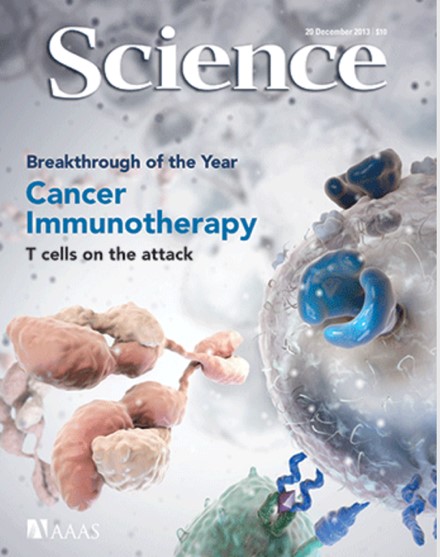Human Immunology & Immunotherapy Initiative (HI³)
The Human Immunology and Immunotherapy Initiative (HI3) successfully competed for $20 million in funding from the University of Colorado School of Medicine Dean’s Office Transformational Research Funding awards and was started in January 2016.
The opportunity
After decades of investigation establishing principles in animal models, it has recently become possible to treat and cure some diseases in humans by interventions that target immunological functions. Immunotherapy, described by Science magazine (20 December 2013) as the Breakthrough of the Year in 2013, has led to major changes in the standard of care for some diseases and is particularly useful in infectious disease, autoimmunity, allergy/asthma, and especially cancer.

The mission
The mission of the Human Immunology and Immunotherapy Initiative (HI3) is to develop the infrastructure to create an all-inclusive facility that provides experimental models for the preclinical testing of new candidate therapeutics, reliable immunotherapeutic production, consistent clinical trials research support, and organized immune monitoring capabilities. In addition, the HI3 will train future scientific leaders within the realm of immunotherapy and recruit exemplary faculty to the CU Anschutz medical campus that will complement and enhance existing strengths.
The ultimate goal of the HI3 is to establish preeminence in human immune system-targeted therapies on the CU Anschutz medical campus.
Existing strengths
The integrated campus with outstanding facilities for biomedical research, patient care, medical education and biotechnology provides an exceptionally strong foundation from which the existing immunology and clinical programs can expand their focus to become preeminent in human immunology and immunotherapy.
Core strength on immunology lies in the Department of Immunology and Microbiology, Department of Medicine Divisions of Allergy & Clinical Immunology and Rheumatology and in the Barbara Davis Center for Childhood Diabetes. Complementing this community are affiliate faculty at National Jewish Health. Taken together the current core comprises more than 70 faculty and their laboratories. The focus of this community lies primarily in understanding basic immune functions, autoimmunity, and host pathogen interactions. The HI3 will leverage this expertise to establish preeminence in development and delivery of next-generation immunotherapies. New faculty and infrastructure will bridge this expertise to clinical and service elements described below.
The University of Colorado NCI-Designated Comprehensive Cancer Center is ranked 15th in the nation by US News and World Report. The UCCCC an NCCN member center since 2013 and a member of the ORIEN network since 2015. The center spans multiple campuses and clinical hospital facilities, brings together expertise in basic and clinical sciences, with a strong tradition of transdisciplinary research and translation.
The Department of Medicine Division of Medical Oncology has a significant number of physician-scientists collaborating within the Division and the Cancer Center. The Department of Medicine Division of Hematology/Hematological Malignancies/Bone Marrow Transplant has recently expanded, adding physician-scientists focused on leukemia and lymphomas, with interest in the delivery of cell-based therapies.
The Department of Surgery is growing a major focus of research in tumor immunology under the direction of its new chair Richard Schulick. A strong transplant immunology program also currently exists in the Department.
The Department of Neurology’s Neuroimmunology/Multiple Sclerosis Section encompasses one of the largest MS clinical operations in the nation with approximately 9,000 patient visits per year at its four clinic sites, is the home of the country’s largest MS brain biorepository, a National MS Society funded Collaborative MS Research Center, and supports a multi-million dollar research portfolio.
The clinical home of the Department of Pediatrics is Children’s Hospital Colorado. The hospital’s Center for Cancer and Blood Disorders houses the region’s only Pediatric Neuro-Oncology Program, the only program for adolescents and young adults with cancer, the only Pediatric Blood and Marrow Transplant Program, the only Meta-iodobenzylguanidine (MIBG) Program and the only pediatric Experimental Therapeutics Program.
ClinImmune Labs, an FDA-licensed GMP facility Bioscience II, is active in production of clinical grade hematopoietic and mesenchymal stem cells. ClinImmune functions in compliance of all FDA guidance and has an experienced regulatory team that has successfully filed with the FDA for both investigational new devices and biologic license applications.
Gates Biomanufacturing Facility consists of 14,000-square-feet of total space with 3,800-square-feet of dedicated to clean activities. This facility offers the capability to manufacture both cell-therapy- and protein-based biologics.
Specific aims
- Develop infrastructure needed for research in human immunology and development and testing of therapeutics.
- Establish human immune monitoring and mass cytometry facility to monitor immune status and responses of subjects using reliable, standardized, technically advanced assays.
- Facilitate translational research by promoting faculty networking and access to human tissues.
- Provide huSCID models for preclinical testing of candidate therapeutics.
- Enable GMP production of immunotherapeutics.
- Recruit new faculty who have outstanding expertise in development and delivery of immunotherapy.
- Facilitate clinical research support.
- Train the next generation of scientists who will become leaders in this area.
Leadership
Leslie Berg, PhD, Director
Terry Fry, MD, Co-Director
Aimee Bernard, PhD, Assistant Director
Board of Directors
Kathleen Barnes, PhD, Professor of Medicine, Division of Biomedical Informatics & Personalized Medicine